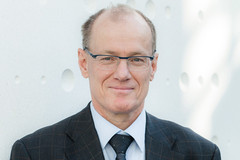
Prof. Dr. Martin Krönke
Institut für medizinische Mikrobiologie, Immunologie und Hygiene
Uniklinik Köln
Goldenfelsstr. 19-21
50935 Köln
The CECAD research group led by Prof. Dr. Martin Krönke explores the lipid composition of cell membranes and its alterations in the aging organism. A reduction in the concentration of specific enzymes of sphingolipid metabolism, ceramide synthases-1 and -5 results in changes in the lipid composition in membranes, leading to myopathy of skeletal muscles. In humans, this is associated with frailty of elderly people and of patients with chronic critical diseases. One other isoform of the family of ceramide synthases, ceramide synthase-4, has been shown to be involved in the regulation of the hair follicle cycle. Down-regulation of ceramide synthase-4 leads to age-dependent hair loss. The precise mechanisms of action of both ceramide synthase-1,-5, and -4 have not yet been explored. The group’s findings will break new ground in the understanding of the impact of age-dependent changes of sphingolipid concentrations in cell membranes and open avenues for novel therapies, especially for older patients.
Our research: Every cell in our body is controlled by cell surface receptors that transmit external signals into the cell. These receptors are located in the plasma membrane and their respective function depends on the lipid composition they are embedded in. The lipid composition of plasma membranes changes during aging, suggesting that this may compromise the function of these receptors.
The laboratory led by Prof. Krönke has discovered that the activity of ceramide synthases-1 and -5, two members of the family of enzymes primarily involved in the production of sphingolipids, decline as we age. A lack of these enzymes triggers myopathy of skeletal muscle in mice, which is reminiscent of critical illness myopathy in humans and of sarcopenia affecting elderly people. A genetic model of deficiency of another member of the ceramide synthase family, ceramide synthase-4, revealed that this enzyme is involved in the regulation of the hair follicle cycle. A loss of ceramide synthase-4 activity causes age-dependent hair loss. The research group is now aiming to elucidate the underlying molecular mechanisms by which ceramide synthase-1 and -4 specifically change the sphingolipid composition of plasma membranes. One goal is the identification of the cell surface receptors that are sensitive to changes of sphingolipids in membranes and respond with transmitting pathogenic signals to the cell interior.
Our successes: The previous findings of Prof. Krönke’s research group have contributed to improving our understanding of the function of NADPH oxidases. NADPH oxidases are enzymes that lead to the release of reactive oxygen species (ROS). Increased ROS production has been implicated in serious disorders such as cancer and neurodegenerative diseases and also in the aging of the body. The laboratory has succeeded in identifying the mechanism that regulates the production of ROS triggered by the potent inflammatory cytokine tumor necrosis factor (TNF), whose plasma concentrations are frequently found to be increased in the blood of elderly individuals.
Our goals: The research group is working on explaining why some elderly individuals or seriously and chronically ill patients develop a unique kind of muscle disorder. One primary research area of the lab focuses on the precise molecular mechanisms by which sphingolipids control membrane integral receptor function. The team’s observations suggest ceramide synthases as therapeutic targets to halt the process of mypoathy and to prevent age-dependent hair loss. This translational aspect will be pursued in cooperation with the new CECAD unit ´Translational Research´.
Our methods/techniques: Prof. Krönke’s group works with samples from patients and from model organisms that represent the various ceramide synthase disorders. A major advantage of CECAD is the Lipidomics Facility headed by Susanne Brodesser, who is invaluable for the analysis of membrane lipid composition using state-of-the-art mass spectrometry.

Prof. Dr. Martin Krönke
Institut für medizinische Mikrobiologie, Immunologie und Hygiene
Uniklinik Köln
Goldenfelsstr. 19-21
50935 Köln



Figure 1: CerS4 localisation in the hair follicle
Figure 2: Ectopic sebaceous glands in CerS4-deficient mice
Figure 3: Missing 2º Telogen in CerS4 -/- mice